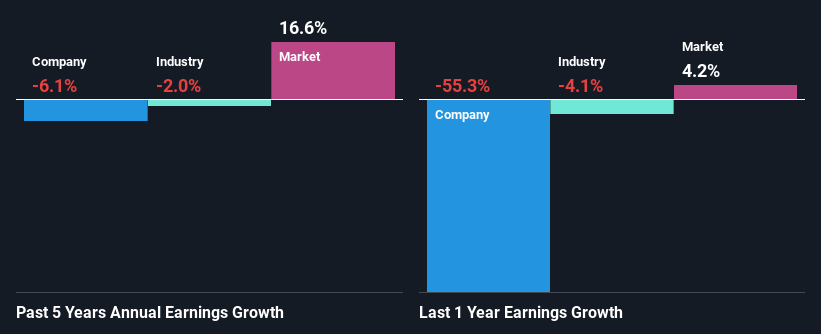Is Elders Limited's (ASX:ELD) Recent Performance Underpinned By Weak Financials?

Elders (ASX:ELD) has had a rough month with its share price down 14%. Given that stock prices are usually driven by a company’s fundamentals over the long term, which in this case look pretty weak, we decided to study the company's key financial indicators. Particularly, we will be paying attention to Elders' ROE today.
Return on Equity or ROE is a test of how effectively a company is growing its value and managing investors’ money. In simpler terms, it measures the profitability of a company in relation to shareholder's equity.
How Is ROE Calculated?
The formula for ROE is:
Return on Equity = Net Profit (from continuing operations) ÷ Shareholders' Equity
So, based on the above formula, the ROE for Elders is:
5.9% = AU$50m ÷ AU$845m (Based on the trailing twelve months to September 2024).
The 'return' is the income the business earned over the last year. Another way to think of that is that for every A$1 worth of equity, the company was able to earn A$0.06 in profit.
Check out our latest analysis for Elders
Why Is ROE Important For Earnings Growth?
We have already established that ROE serves as an efficient profit-generating gauge for a company's future earnings. We now need to evaluate how much profit the company reinvests or "retains" for future growth which then gives us an idea about the growth potential of the company. Assuming everything else remains unchanged, the higher the ROE and profit retention, the higher the growth rate of a company compared to companies that don't necessarily bear these characteristics.
Elders' Earnings Growth And 5.9% ROE
On the face of it, Elders' ROE is not much to talk about. However, given that the company's ROE is similar to the average industry ROE of 5.0%, we may spare it some thought. But then again, Elders' five year net income shrunk at a rate of 6.1%. Bear in mind, the company does have a slightly low ROE. Hence, this goes some way in explaining the shrinking earnings.
Furthermore, even when compared to the industry, which has been shrinking its earnings at a rate of 2.0% over the last few years, we found that Elders' performance is pretty disappointing, as it suggests that the company has been shrunk its earnings at a rate faster than the industry.

Earnings growth is an important metric to consider when valuing a stock. The investor should try to establish if the expected growth or decline in earnings, whichever the case may be, is priced in. Doing so will help them establish if the stock's future looks promising or ominous. Is Elders fairly valued compared to other companies? These 3 valuation measures might help you decide.
Is Elders Efficiently Re-investing Its Profits?
Elders' declining earnings is not surprising given how the company is spending most of its profits in paying dividends, judging by its three-year median payout ratio of 66% (or a retention ratio of 34%). With only very little left to reinvest into the business, growth in earnings is far from likely. You can see the 5 risks we have identified for Elders by visiting our risks dashboard for free on our platform here.
Moreover, Elders has been paying dividends for seven years, which is a considerable amount of time, suggesting that management must have perceived that the shareholders prefer consistent dividends even though earnings have been shrinking. Based on the latest analysts' estimates, we found that the company's future payout ratio over the next three years is expected to hold steady at 57%. Regardless, the future ROE for Elders is predicted to rise to 11% despite there being not much change expected in its payout ratio.
Conclusion
Overall, we would be extremely cautious before making any decision on Elders. As a result of its low ROE and lack of much reinvestment into the business, the company has seen a disappointing earnings growth rate. With that said, we studied the latest analyst forecasts and found that while the company has shrunk its earnings in the past, analysts expect its earnings to grow in the future. Are these analysts expectations based on the broad expectations for the industry, or on the company's fundamentals? Click here to be taken to our analyst's forecasts page for the company.
If you're looking to trade Elders, open an account with the lowest-cost platform trusted by professionals, Interactive Brokers.
With clients in over 200 countries and territories, and access to 160 markets, IBKR lets you trade stocks, options, futures, forex, bonds and funds from a single integrated account.
Enjoy no hidden fees, no account minimums, and FX conversion rates as low as 0.03%, far better than what most brokers offer.
Sponsored ContentValuation is complex, but we're here to simplify it.
Discover if Elders might be undervalued or overvalued with our detailed analysis, featuring fair value estimates, potential risks, dividends, insider trades, and its financial condition.
Access Free AnalysisHave feedback on this article? Concerned about the content? Get in touch with us directly. Alternatively, email editorial-team (at) simplywallst.com.
This article by Simply Wall St is general in nature. We provide commentary based on historical data and analyst forecasts only using an unbiased methodology and our articles are not intended to be financial advice. It does not constitute a recommendation to buy or sell any stock, and does not take account of your objectives, or your financial situation. We aim to bring you long-term focused analysis driven by fundamental data. Note that our analysis may not factor in the latest price-sensitive company announcements or qualitative material. Simply Wall St has no position in any stocks mentioned.
About ASX:ELD
Elders
Provides agricultural products and services to rural and regional customers primarily in Australia.
Undervalued moderate.
Similar Companies
Market Insights
Community Narratives




